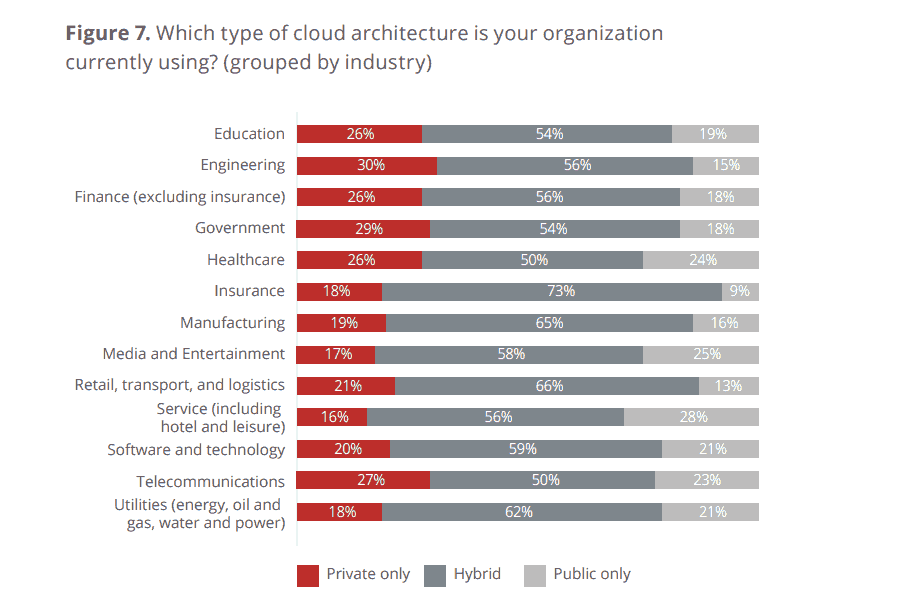Imagine waking up one day to find out that someone hacked your business, and all your data is gone.
Hundreds of files, thousands of work hours, and hundreds of thousands of dollars just vanished in an instant.
The situation might sound like a nightmare, but the possibility is all too real for businesses without a strong cloud strategy. Just think about all the cyber breaches the world has witnessed recently. We mentioned some of them in our recent cloud security tips roundup, where we discussed the best practices to avoid becoming a statistic.
This time, we will focus on the infrastructure that can help you minimize the risk of a breach. The article below examines the differences between public and private clouds, as well as security and other benefits of storing your data in a dedicated environment.
Types of Clouds
Public cloud and private cloud hosting are the two distinct types of cloud infrastructure deployments. Both are optimal for business use, and each organization should carefully weigh their options to find which one is best for them.
One of the most common uses of public clouds is for running web servers and development systems. Its key advantage is cost-efficiency since it is a multi-tenant environment.
This means that your digital space is shared with other clients on the same server and managed by a data center provider. With this model, you buy a “server slice” that becomes your little corner of the digital landscape.
The use of public cloud is often paid by the hour, and you can scale the services as you need them. This plan is ideal if you are continually building up and tearing down servers.
Private clouds, on the other hand, are used by a single client or company.
They are also called “dedicated,” “corporate,” or “internal clouds,” which reflects their primary use.
Your data storage and network resources reside in a dedicated environment, where they cannot be affected in any way by other tenants in the same environment.
Benefits of Private Cloud

The critical difference between private and public clouds lies in the way your business uses them. Depending on your company size and your business needs, you can choose one or the other, or even create a hybrid environment that would use both.
Medium, large businesses, and healthcare providers typically opt for a private cloud due to its protection, compliance, and scalability options. With high volumes of sensitive information, such as customer information, confidential internal records or business plans, such companies need the extra defense. Unlike public clouds, dedicated clouds give businesses full control over their data and configurations.
The third type of cloud environment is called a hybrid cloud, and it combines elements of the other two platforms. Hybrid settings allow you to move between public and private which gives greater flexibility. This makes them ideal for companies with a fluctuating workflow and dynamic business models.
Features and Benefits of Private Clouds
Private clouds have many advantages that its alternatives just don’t offer. According to a recent McAfee survey report, the use private-only infrastructure has dropped compared to last year. Yet, it remains a preferred model in industries such as engineering, government, healthcare, education, and telecommunication, as shown in the graph below.

Source: https://www.mcafee.com/us/solutions/lp/cloud-security-report.html
Given the stats, the private cloud is still very popular, but what makes it so great? Here are some benefits of private cloud technology:
Control
Dedicated clouds are usually located on-site or at a data center provider, making it easier to access when needed. Your IT team can efficiently manage the platform and make changes when needed. They can predict things like downtime and bottlenecks in service delivery. They can also better adjust the usage of resources to their company’s needs.
On the other hand, those who use public clouds do not have that much of flexibility when it comes to managing their resources.
Stability
Cloud computing largely replaced hard drives, computers, flash drives, and USBs. While it still uses many different types of drives to build its storage platforms, it also provides a greater degree of data security by distributing data to secure hosting sites and ensuring everything stays online. However, for the best protection, you need sound protocols in place and comprehensive disaster recovery and backup solutions.
Private clouds are particularly convenient for storing sensitive files, as your in-house teams are responsible for ensuring that your platform keeps running. You don’t have to worry about your vendor’s or neighbors’ activities affecting your systems, and you can manage your infrastructure more efficiently.
Customization
You can configure your platform in the way that best suits you and your business’s needs. They can adapt to companies of different sizes, industries, overhead, objectives, and other factors. Look at your company’s requirements and decide what works best for you based on your availability, security, and scalability needs.
Cloud Compliance
With the ability to fully control cloud storage and bandwidth, customize environments, or adjust security settings, companies have greater control over their infrastructure.
They can build a platform that is compliant with relevant laws and industry regulations base on their business objectives. As opposed to the public cloud, private cloud data can harder become a subject of external inspection or malevolent interception.
Availability

An advantage of cloud computing is that you can scale resources as you need them. Even if a single server goes down, your data is automatically replicated to other backup locations, making it available to you anytime. Also, during peak periods, bandwidth and network resources can be scaled up to support your needs.
Value With cloud technology
When it comes to cost comparison between public and private clouds, the latter can be significantly more expensive. The actual price of your infrastructure will depend on multiple factors, but it certainly pays off to invest in dedicated infrastructure than risk with the public cloud offering.
The upsides of this hosting are almost too innumerable to count, but there is one feature that stands above the rest: the cloud’s unparalleled safety.
Greater Security and Privacy with private cloud backup

You will hardly find a more secure option when it comes to cloud computing. Private clouds are excellent for anyone looking to protect their data and information from hackers, outsiders, and prying eyes. Every business wants top-notch safety because any leaked data or spilled secrets can doom an organization.
The McAfee report mentioned above reveals that 93% of organizations surveyed utilize cloud services in some form. The higher adoption means companies need to look for new ways to stay safe consistently.
With a private cloud, your in-house team can manage single-handedly and have full control over all the data. Even if a third-party data center manages your resources, you know exactly where your files are and can provide the necessary precautions to keep it safe.
In a shared public cloud space, all information resides on a shared platform and security concerns are proportionally more significant.
To put it plainly, one of the most significant advantages of private clouds over public clouds is in the name: privacy. You know where your data is. You know who has access and authority. You know what changes are happening.
Of course, this is a tremendous responsibility for you and your company since everything lies in your own hands.
Benefits of Private Cloud Technology
Businesses in every industry need a safe way to store and access their information with a secure service provider.
More companies are turning to the cloud to get more flexibility in managing their teams and workloads. With such an increased use, concerns grow, and companies are focusing more on data protection.
While public cloud automation offers a range of benefits such as self-service, scalability, and cost-effectiveness, private cloud service give you a higher degree of security.
With safety and control being key to successfully operating your business, private cloud is a reasonable solution for a wide range of businesses. If your company handles sensitive data, operates under heavy scrutiny and compliance regulations, or simply requires the highest level of safety and customization, the private cloud is a way to go.



